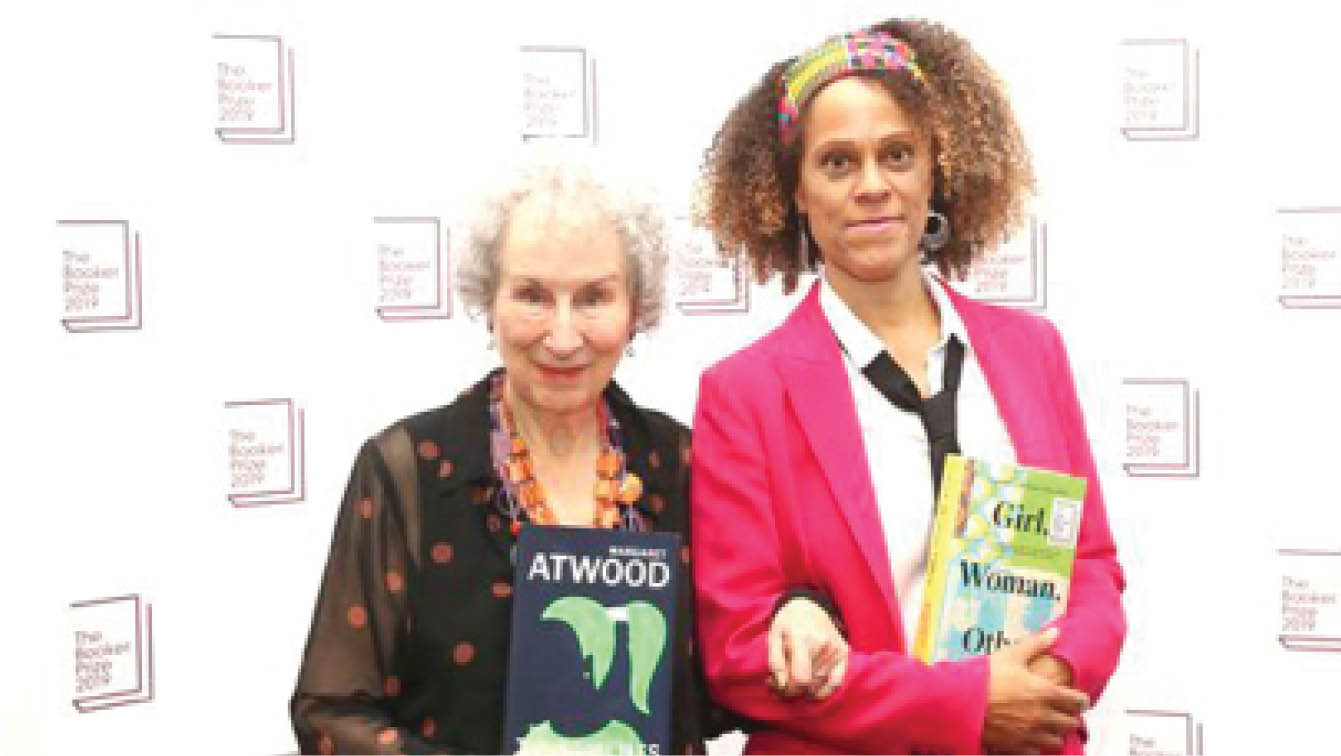Booker Prize 2019: Nigerian writers react
Book lovers have waited anxiously for the announcement of this year’s Booker Prize winner since the shortlist was released with two Nigerians, Chigozie Obioma and Bernadine Evaristo, contesting for the award. Finally, two winners instead of one have emerged. Monday, October 14, proved to be a long day and an even longer night for […]

Margaret Atwood and Bernardine Evaristo jointly awarded Booker Prize
Book lovers have waited anxiously for the announcement of this year’s Booker Prize winner since the shortlist was released with two Nigerians, Chigozie Obioma and Bernadine Evaristo, contesting for the award. Finally, two winners instead of one have emerged.
Monday, October 14, proved to be a long day and an even longer night for writers and literary-minded Nigerians as they awaited the announcement of the ultimate winner of the 2019 Booker Prize.
Already, the shortlist proved to be very competitive with Nigeria’s Chigozie Obioma on the shortlist for his novel, ‘An Orchestra of Minorities’ and Bernadine Evaristo, who is also British, for ‘Girl, Woman, Other’. Others included Margaret Atwood (‘The Testaments’), Lucy Ellmann (‘Ducks, Newburvport’), Salman Rushdie (‘Ouichotte’) and Elif Shafak (10 Minutes 38 Seconds in This Strange World’).

Interestingly, for the first time since 1992, the Booker Prize gave a joint award to Evaristo, 60, and Atwood, 75 on Monday. In an article in The Guardian UK titled ‘The Booker prize judges have exposed the doublethink behind our arts awards’, Charlotte Giggins wrote: you can see the dilemma. On the one hand, there is a bestselling novel that has nailed a political moment, by a writer hailed as a prophet of our times. On the other, there is a verse novel capturing the hidden voices of black British women, by a writer who has honed her art for years outside the spotlight. To give the prize to Margaret Atwood’s ‘The Testaments’ would put the Booker in the centre of the cultural tide. To give it to ‘Give, Woman, Other’ by Bernardine Evaristo would push a deserving but unsung book towards a much wider audience.
The joint award has received some backlash, and one of the judges, Efua Hirsch, in another article in the Guardian UK, said: “I’m bemused by the criticisms, many of which stem from the fact that the Booker rules stipulate that only one book can win. I witnessed journalists – a tribe of professional troublemakers of which I’m proud to call myself a member – outraged that we dared to break the rules. I’ve seen lawyers, whose profession involves interpretation and the application of principles of justice, complain that we did not adhere to the letter of the law. I’ve heard people complain that we didn’t give it to Atwood alone, or Evaristo alone. I’ve seen plenty of people question how you can ever compare the two.”
Back in Nigeria, TJ Benson, author of a collection of short stories, ‘We Won’t Fade into Darkness’ and ‘The Madhouse’, his debut novel forthcoming from Masobe Books, expressed his excitement at this year’s Booker Prize. “I’m very excited that Bernardine Evaristo is joint winner of the prize because she is the first black to win it. I find it significant that she is winning the prize the same year Toni Morrison, the first black woman to win the Nobel Prize, died. She is the second Nigerian to win the prize,” he said.
Many Nigerians hoped Obioma, who was nominated in 2015 for his debut novel ‘The Fishermen’, would win this year. Azafi Omoluabi, co-publisher of Parrésia, was one of those hopefuls. “I was rooting for Chigozie to win, not only because he’s a Parrésia author, but because his book ‘An Orchestra of Minorities’ is beautiful to read. As Nigerians we look out for our own. But, l also think the winners deserve it, especially Bernadisto who is Nigerian too,” she said.
Umar Abubakar Sidi, author of a poetry collection, ‘The Poet of Dust’, said he has read Shafak, Rushdie and Obioma’s works. He said: “Obioma is really good. I would have been disappointed had Rushdie won. Splitting the prize is a failure on the judges. Having read reviews of all the shortlisted books I wished Ducks Newburyport by Lucy Elman had won or ‘An Orchestra of Minorities’, for books offering fresh and stimulating perspectives.”
In 2018 Soji Cole won the Nigerian Prize for Literature for his play, ‘Embers’. As far as he is concerned the Booker Prize has come and gone, although he is disappointed that Obioma didn’t win.
“I can’t fault the judgement of the assessors. Each Prize has its own peculiarity. When you put reputable people in charge of prizes like this there’s little room for doubt, even if their judgment does not tally with yours. A lot goes into judging literary works and what we usually forget also is what I have always called ‘taste’. This has nothing to do with politics. We grumble every time the Nobel is awarded having common knowledge that some African writers are due for it. When Soyinka won the Nobel, some international writers grumbled that he’s not deserving of the prize. Every prize has its politics and its taste. If the taste doesn’t work your work wouldn’t even fit into the politics. The winners deserve it. Those who didn’t win could have been the winner. Chigozie is a very brilliant writer. I know he will win this prize in a matter of time. He would win bigger prizes. I feel pained that he didn’t win this one.”
The Booker Prize is awarded annually to the best novel of the year written in English and published in the UK or Ireland. The winner goes home with £50,000 in prize money. Nigeria’s Ben Okri won in 1991 for his novel, ‘The Famished Road.’
